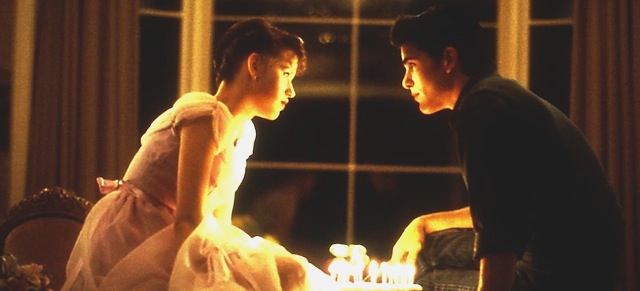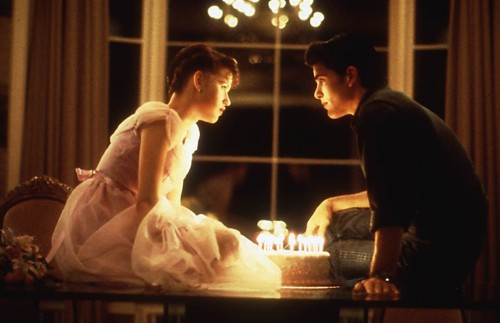
I’ve noticed a thread that runs through a few of my favorite (relatively) recent films. Win Win and City Island and Ruby Sparks and Secrets and Lies and even last year’s Flight–all highly recommended–tell stories where the thing that everyone is dreading, the outcome that the characters are working tirelessly to avoid, turns out to be the key to their personal happy ending. Films, in other words, where the worst thing that could happen turns out to be the best thing and vice versa. This is what John Z talks about so beautifully in the opening to Grace in Addiction, in reference to one of John Hughes’ 80s masterpieces:
Do you remember the 1980s classic film Sixteen Candles? It tells the story of Claire’s life on the day of her sixteenth birthday, which also happens to be the day of her older sister’s wedding. Poor Claire quickly realizes that her family has completely forgotten about her birthday. No gifts await her; no one tells her “Happy birthday.” And so the worst day of her life begins.
As the movie unfolds, her self-pity transforms from anger to apathy, and finally from apathy into despair. Despite this downward spiral, the viewer soon realizes that a second, more important plot is afoot. It involves Jake, the young man she has a crush on. She doesn’t think that he even knows of her existence, but Claire is luckily mistaken – he knows exactly who she is. By the end of the film, through an amazing series of tragic and hilarious events, she finds herself celebrating her sixteenth birthday alone with Jake. When she finally blows out the candles on her cake, she doesn’t have to make a wish because her wish has come true—it is sitting across from her! The worst day of her life has become the best.
The first of the Twelve Steps–“We admitted we were powerless over alcohol—that our lives had become unmanageable”–follows a similar pattern. It draws attention to the darkest aspects of life and, in so doing, opens the door to a second, unexpected narrative that is full of hope and promise.
It’s not much of a leap to see the profound resonance this pattern has with Lent. In the trials and tribulations of Christ–in his death–something that could not be worse is actually something that could not be better. The defeat is the victory. To cast it in vertical terms, “God chose the foolish things of the world to shame the wise; God chose the weak things of the world to shame the strong.” (1 Cor 1:27). This is what we commonly refer to as “a theology of the cross.”
 Fortunately, this is not just the way things happen on screen or in the Bible. This is real life, as Erin Callan’s stirring op-ed in Sunday’s NY Times, “Is There Life After Work?”, powerfully attests. Callan is the former CFO of Lehman Brothers, the one-time “most powerful woman on Wall Street”, her tenure running the infamous period of Sept 2007 to June 2008. Couched as it may be in terms of the current work-life balance debate, Callan’s column offers a refreshingly vulnerable counterpoint to Sheryl Sandberg’s new unashamedly (and confusedly) do-more-try-harder book, Lean In. But regardless of what you make of that whole issue, Callan’s story is what matters here. It’s a true testament to “hope amidst the ruins”, the crucial difference between what we want and what we need, and how our idols often (always?) have to be pried out of our hands. Such is the nature of our stubbornness. But it’s also a testament to the way the best gifts tend to come as a surprise, often an initially unpleasant one. Consumed by self-imposed–and culturally reinforced–compulsions, it took a mighty, um, crash to deliver Callan from herself:
Fortunately, this is not just the way things happen on screen or in the Bible. This is real life, as Erin Callan’s stirring op-ed in Sunday’s NY Times, “Is There Life After Work?”, powerfully attests. Callan is the former CFO of Lehman Brothers, the one-time “most powerful woman on Wall Street”, her tenure running the infamous period of Sept 2007 to June 2008. Couched as it may be in terms of the current work-life balance debate, Callan’s column offers a refreshingly vulnerable counterpoint to Sheryl Sandberg’s new unashamedly (and confusedly) do-more-try-harder book, Lean In. But regardless of what you make of that whole issue, Callan’s story is what matters here. It’s a true testament to “hope amidst the ruins”, the crucial difference between what we want and what we need, and how our idols often (always?) have to be pried out of our hands. Such is the nature of our stubbornness. But it’s also a testament to the way the best gifts tend to come as a surprise, often an initially unpleasant one. Consumed by self-imposed–and culturally reinforced–compulsions, it took a mighty, um, crash to deliver Callan from herself:
I didn’t start out with the goal of devoting all of myself to my job. It crept in over time. Each year that went by, slight modifications became the new normal. First I spent a half-hour on Sunday organizing my e-mail, to-do list and calendar to make Monday morning easier. Then I was working a few hours on Sunday, then all day. My boundaries slipped away until work was all that was left.
Inevitably, when I left my job, it devastated me. I couldn’t just rally and move on. I did not know how to value who I was versus what I did. What I did was who I was.
Sometimes young women tell me they admire what I’ve done. As they see it, I worked hard for 20 years and can now spend the next 20 focused on other things. But that is not balance. I do not wish that for anyone. Even at the best times in my career, I was never deluded into thinking I had achieved any sort of rational allocation between my life at work and my life outside.
I have also wondered where I would be today if Lehman Brothers hadn’t collapsed. In 2007, I did start to have my doubts about the way I was living my life. Or not really living it. But I felt locked in to my career. I had just been asked to be C.F.O. I had a responsibility. Without the crisis, I may never have been strong enough to step away. Perhaps I needed what felt at the time like some of the worst experiences in my life to come to a place where I could be grateful for the life I had. I had to learn to begin to appreciate what was left.
At the end of the day, that is the best guidance I can give. Whatever valuable advice I have about managing a career, I am only now learning how to manage a life.
The congruence is too uncanny not to re-run the Skip Ryan video:
Skip & Barbara Ryan Story of Rescue from PCPC Video on Vimeo.

COMMENTS
2 responses to “Lighting Sixteen Candles at Lehman Brothers: When the Worst Thing Is the Best Thing”
Leave a Reply














this is such a brilliant commentary on an amazingly vulnerable article…I know when I had my nervous breakdown after realizing that my “dream job” in investment banking was actually making me miserable, I saw no way out whatsoever. Now, two years later I can look back and see that my “worst thing” has truly turned out to be the best, and my entire perspective on work, money, and success has been radically transformed. Glory be to God